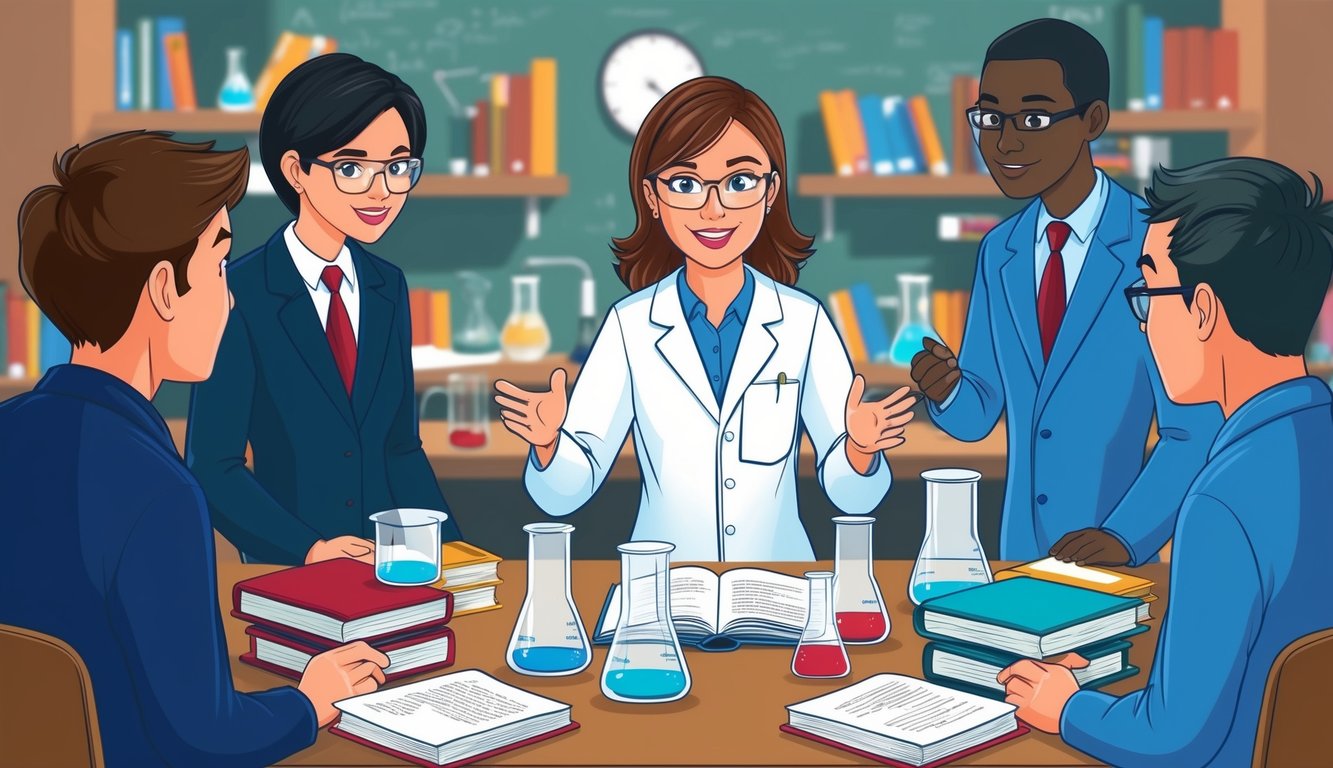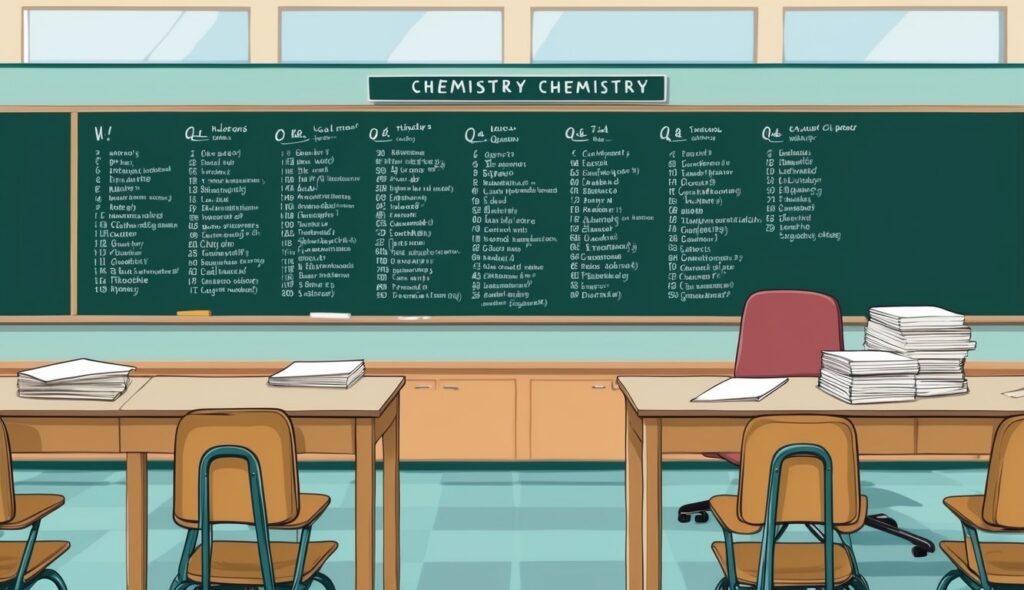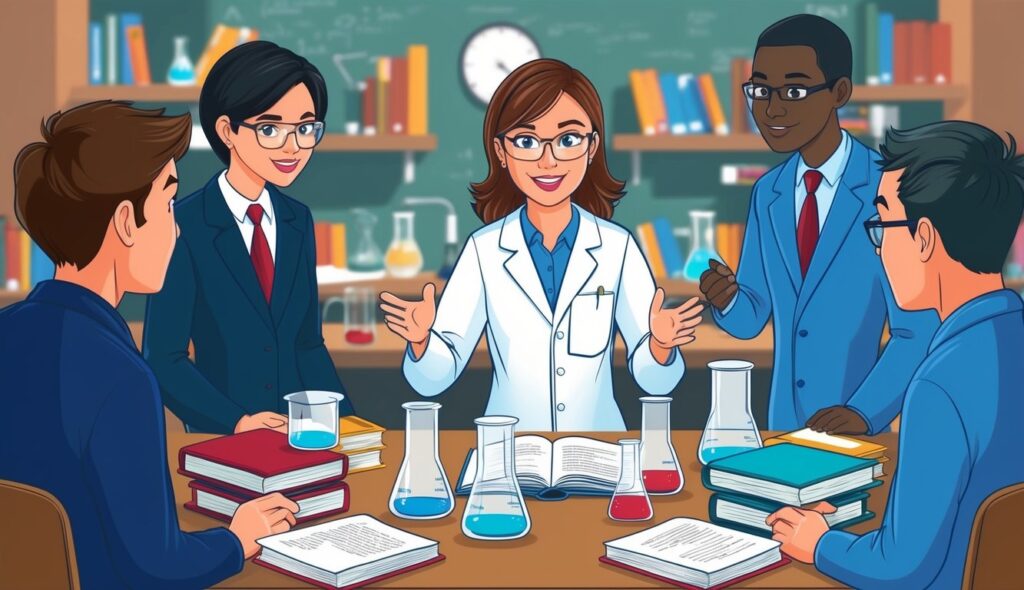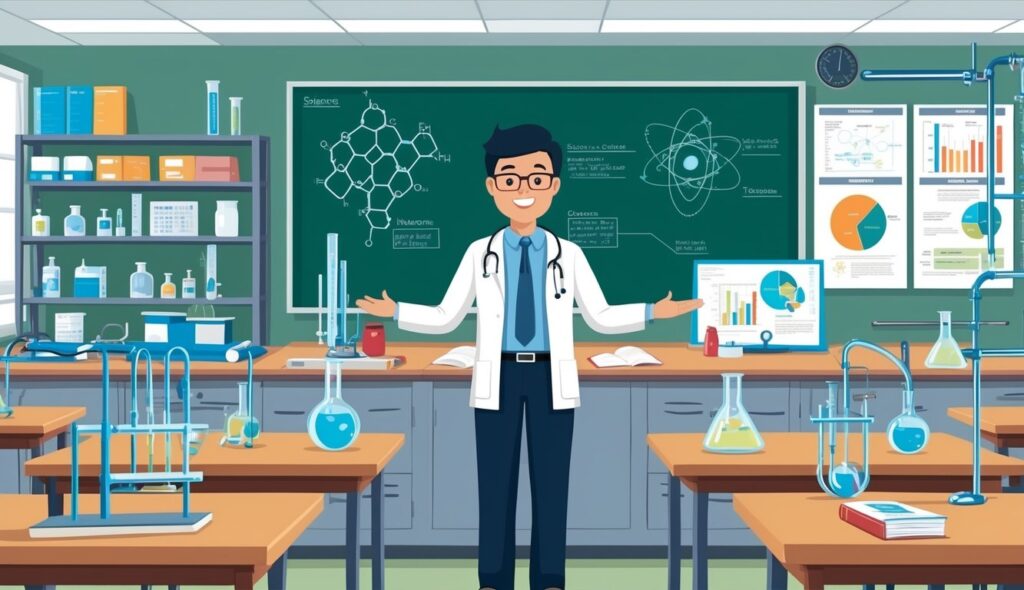150 Chemistry Teacher Job Interview Questions: Comprehensive Guide for Success

Getting ready for a chemistry teacher job interview might feel a bit technical, but having the appropriate questions can truly set you up for success.
It’s important to know what to expect during these interviews so you can feel confident and ready. This post will guide you through the key questions you might face. This post covers 150 Chemistry Teacher Job Interview Questions: Comprehensive Guide for Success.
Whether you’re a seasoned teacher or just starting out, understanding what interviewers are looking for helps. From questions about teaching methods to dealing with classroom challenges, being well-prepared puts you ahead.
These 150 questions cover a variety of topics tailored to chemistry teachers. With these questions, you’ll be able to practice and refine your responses to show your best self during the interview.
Understanding the Role of Chemistry Teacher

A chemistry teacher’s job is crucial to helping students grasp scientific concepts. You will guide students through experiments and lessons, making chemistry interesting and accessible.
Chemistry Teacher Responsibilities
As a chemistry teacher, your main job is to plan and deliver lessons that follow the chemistry curriculum. You prepare lesson plans, conduct experiments, and grade assignments.
It’s crucial to maintain a safe laboratory environment and to ensure students understand safety procedures.
You are also responsible for assessing student performance. This involves creating tests and assignments that measure understanding. Offering extra help outside class time is often necessary.
Regularly updating your teaching methods and materials is the key. Staying informed about new developments in science helps keep your lessons fresh and engaging.
Skills Required for Chemistry Teachers
To excel as a chemistry teacher, it’s important to have strong subject knowledge. You must be able to explain complex chemistry concepts in an easy-to-understand way.
Communication skills are essential. You need to communicate effectively with students, parents, and colleagues. Patience is also important since students have different learning speeds.
Classroom management skills are another must. Creating a productive and respectful learning environment is vital. Being organized helps manage multiple tasks like grading and lesson preparation efficiently. Additionally, familiarity with educational technology can enhance your teaching methods.
List of 150 Chemistry Teacher Job Interview Questions

- How do you make complex chemistry concepts accessible and engaging for students?
“I break down complex concepts into smaller, manageable parts by relating them to real-life applications or everyday experiences. For example, when teaching the concept of molarity, I might compare it to cooking by explaining how measuring ingredients impacts the final product. I also incorporate hands-on demonstrations, visual aids, and interactive lab experiments to ensure students actively engage with the material and grasp abstract ideas.” - How do you handle classroom management during a hands-on chemistry lab?
“Safety and clear expectations are my top priorities in a chemistry lab. I start every lab session by reviewing safety protocols and ensuring that all students understand the procedures they will perform. I set clear behavioral expectations and establish routines that emphasize teamwork, responsibility, and attentiveness. While students are conducting experiments, I circulate the room to monitor progress, provide guidance, and address any concerns promptly to maintain a safe, focused learning environment.” - How do you support students who are struggling in your class?
“I believe in creating a supportive and inclusive learning environment. When a student struggles, I first identify the root of the difficulty by reviewing their work, assessing their understanding, and having one-on-one discussions if necessary.
Additionally, I create differentiated instruction opportunities, such as offering alternative explanations, using visual aids, or incorporating peer tutoring. My goal is to build their confidence and provide the scaffolding they need to succeed.” - How do you integrate areas of strength in the curriculum?
“I integrate areas of strength into the curriculum by identifying both my expertise and the students’ interests to create a more engaging and personalized learning environment. For example, if my strength lies in hands-on laboratory work, I design experiments and practical activities that align with the curriculum while allowing students to explore key chemistry concepts through inquiry-based learning.” - How do you differentiate instruction to meet the needs of diverse learners in your classroom?
“I differentiate instruction by recognizing the unique learning styles, abilities, and needs of each student. I begin by assessing students’ prior knowledge and learning preferences through formative assessments and ongoing observation. Based on this information, I design lessons that offer multiple pathways for students to engage with the material, such as through visual aids, hands-on activities, technology integration, or group discussions.” - What motivates you to become a chemistry teacher?
Passion for science and a desire to inspire the students to understand the world around them. - How do you engage students who find chemistry challenging?
I use relatable examples and interactive activities to make concepts easier and more exciting. - Describe a successful lesson on chemical reactions you’ve taught.
Students engaged in a ‘kitchen chemistry’ experiment, visually seeing reactions like baking soda with vinegar. - How do you keep updated on new chemistry teaching techniques?
I attend workshops, subscribe to science journals, and participate in teacher forums. - How do you handle difficult classroom behavior?
Implement firm yet fair rules, ensuring a respectful and safe learning environment. - Describe your experience with digital tools in the classroom.
Use tools like interactive whiteboards and simulation software to enhance learning. - What’s your approach to teaching complex subjects such as stoichiometry?
Break down topics into smaller parts and use visual aids to simplify concepts. - How do you incorporate lab safety in your lessons?
Begin each lab with a safety briefing and ensure all rules are visibly displayed. - Describe your strategy for students with different learning styles.
Use a mix of visual, auditory, and hands-on activities to cater to various needs. - Illustrate how you’d teach the periodic table to beginners.
Use color codes and group activities to make patterns and elements clear. - What’s the most important skill students learn in chemistry class?
Critical thinking and problem-solving skills. - How can you contribute to our school’s culture?
Bring enthusiasm, support extracurricular activities, and foster student curiosity. - What is your approach to integrating technology in teaching chemistry?
Use virtual labs and online resources to complement traditional methods. - How do you evaluate the effectiveness of your teaching?
Collect feedback through surveys and observe student engagement and understanding. - Can you adapt lessons for students with special needs?
Yes, by creating individualized plans and using adaptive tools as needed. - How do you stay energized throughout the school year?
Maintain a balanced routine and seek inspiration through professional development. - What role does feedback play in your teaching?
Essential for growth, both for students and myself, fostering an open communication channel. - How do you handle a failed experiment in class?
Turn it into a learning opportunity, discussing why it failed and how to succeed next time. - Describe a time you improved student engagement.
Introducing games and real-life applications made lessons more relatable and interesting. - How would you introduce the concept of pH and acidity?
Use household items and simple experiments to illustrate differences between acids and bases. - How do you incorporate environmental issues in your chemistry curriculum?
Discuss topics like pollution control and sustainable chemistry. - What do you consider a successful learning outcome in your class?
Students can apply concepts to real-world situations with confidence. - What sets you apart from other candidates?
My innovative approach and ability to connect with students on a personal level. - Describe your use of chemistry simulations in class.
Use simulations for complex reactions where live demonstrations aren’t possible. - How do you address controversial science topics like climate change?
Present facts clearly, encourage open discussion, and respect all viewpoints. - What would you do if a lab activity doesn’t go as planned?
Improvise where possible and explain changes to ensure the lesson remains effective. - How do you use data to improve student performance?
Analyze test scores and feedback to tailor future lessons. - How do you involve parents in their child’s chemistry learning?
Send newsletters, hold meetings, and suggest home-based science activities. - What innovative teaching strategies have you used?
Flipped classrooms and project-based learning to enhance engagement. - How do you teach periodic trends effectively?
Use interactive charts and small-group projects to reinforce learning. - What’s your approach to teaching chemical bonding?
Use models and everyday examples to make abstract concepts relatable. - How do you encourage students to pursue science careers?
Share success stories and arrange career talks with professionals. - Explain how you would deal with a student struggling with concepts.
Offer one-on-one tutoring and use relatable examples to clarify difficult points. - How do you ensure no student is left behind in understanding?
Regular check-ins and formative assessments help identify and address gaps. - What do you think about collaboration in science education?
It’s crucial for developing teamwork and communication skills among students. - How do you teach concentration and solutions in an engaging way?
Use real-life scenarios and practical examples to make connections. - What role does hands-on learning play in your teaching?
It’s vital for reinforcing theoretical concepts through practical experiences. - How can you relate chemistry to everyday life for students?
Use examples like cooking, cleaning, and technology to show chemistry’s relevance. - What strategies do you use for teaching balancing chemical equations?
Visual aids and step-by-step exercises simplify complex balancing tasks. - How do you integrate current events in your science discussions?
Link news articles to curriculum topics, making lessons relevant and timely. - How do you manage time effectively during a lab session?
Plan meticulously and allocate time for setup, execution, and cleanup. - How can students contribute to a positive classroom environment?
Encourage respect, responsibility, and active participation. - What makes your teaching style unique?
A focus on nurturing curiosity and creating an inclusive learning space. - How do you incorporate scientific inquiry in lessons?
Engage students in posing questions, experimenting, and drawing conclusions. - What are your strategies for managing large classes?
Use group work, clear instructions, and efficient classroom management techniques.

Questions 51 to 150: Chemistry Teacher Job Interview Questions
- How do you approach grading?
- Describe a memorable student success story.
- What challenges have you faced in teaching chemistry?
- How do you ensure equality in the classroom?
- Describe your teaching philosophy.
- How do you engage with the school community?
- How do you teach significant figures?
- What are the important safety rules in a lab?
- Describe your experience with peer teaching.
- How do you stay organized?
- Why is chemistry important?
- How do you address student mental health?
- Describe your strategies for remote learning.
- How do you motivate your students?
- Describe your experience with inter-disciplinary teaching.
- What do you see as the future of chemistry education?
- How do you balance curriculum standards with creativity?
- What techniques do you use to reduce test anxiety?
- Why did you choose chemistry specifically?
- How do you utilize student feedback?
- What role does experimentation play in teaching?
- How can chemistry help solve global problems?
- Describe a teaching moment you’re proud of.
- How do you handle ethical issues in science?
- How do you address misconceptions about chemistry?
- What are the key topics in your curriculum?
- How do you involve students in lesson planning?
- How do you handle mistakes in teaching?
- What role does research play in your teaching?
- How do you teach oxidation and reduction?
- How do you foster independence in students?
- How do you handle time constraints in exams?
- How do you adapt to curriculum changes?
- What is your strength as a teacher?
- How do you ensure students practice safely in labs?
- How do you teach atomic structure to beginners?
- How do you use guest speakers in class?
- Describe your experience with teaching aids.
- What is your approach to STEM education?
- What keeps you passionate about teaching?
- How do you build rapport with your students?
- How do you address challenging questions?
- Describe how you teach thermodynamics.
- How do you prepare students for higher education?
- What is your favorite chemistry topic to teach?
- Describe how you teach organic chemistry.
- How do you ensure lessons are inclusive?
- How do you facilitate group work?
- How do you evaluate student performance?
- How do you encourage scientific thinking?
- How do you engage advanced students?
- How do you teach moles and molarity?
- How do you incorporate arts in STEM?
- What is your grading philosophy?
- How do you handle diverse learning needs?
- How do you develop a student’s critical skills?
- How do you deal with disruptive behavior?
- What technology tools do you use regularly?
- Describe your experience with curriculum design.
- How do you approach parent-teacher meetings?
- How do you teach chemical kinetics?
- How do you stay patient during difficult lessons?
- Describe your use of cooperative learning.
- How do you address cheating in exams?
- How do you maintain your professional development?
- How do you teach spectroscopy?
- How do you prepare for unexpected challenges?
- Describe your experience with flipped classrooms.
- How do you adapt to different student levels?
- How do you encourage curiosity in class?
- How do you incorporate field trips in lessons?
- What makes chemistry unique as a subject?
- Describe your experience with teaching assistants.
- How do you teach acids and bases?
- How do you build a strong class community?
- How do you handle student burnout?
- How do you explain complex topics simply?
- What are your strategies for lesson plan development?
- How do you use humor in teaching?
- How do you incorporate historical context in science?
- What communication methods do you use with parents?
- How do you teach equilibrium concepts?
- How do you handle grading disputes?
- How do you ensure lab materials are up-to-date?
- Describe your experience with cross-discipline projects.
- How do you handle feedback from management?
- How do you address cultural differences in science?
- How do you clarify student doubts effectively?
- How do you prevent lab accidents?
- Describe your experience with project-based learning.
- How do you stimulate student interest in chemistry?
- What is your approach to multidisciplinary teaching?
- How do you handle curriculum challenges?
- How do you address gender stereotypes in science?
- How do you teach periodic law and its significance?
- How do you monitor student progress?
- How do you teach real-world chemistry applications?
- How do you integrate chemistry with technology?
- How do you teach the concept of chemical bonding?
- How do you make chemistry fun and exciting?
Preparing for the Chemistry Teacher Interview

Being well-prepared for a chemistry teacher interview involves understanding the institution and having a clear teaching philosophy. It also involves preparing a lesson plan that highlights your skills and methods.
Researching the Institution
To make a good impression, research the institution thoroughly. Know its mission, values, and programs. This can usually be found on the institution’s website.
Identify the key leaders, like the principal or department head. This will show you’re serious about joining their team. Learning about the institution’s teaching methods helps align your teaching philosophy with their approach. This can make your responses during the interview more relevant and impressive.
Think about questions you might ask based on your research. This shows genuine interest and engagement with the role and institution.

Developing a Lesson Plan Showcase: 150 Chemistry Teacher Job Interview Questions
Prepare a standout lesson plan that encapsulates your teaching philosophy. Your lesson should be clear, engaging, and relevant to the grade level you’ll teach. Include learning goals and teaching methods. A well-rounded plan may cover topics like chemical reactions or the periodic table, with experiments or discussions to promote understanding.
Think about ways to integrate technology or hands-on activities to make your lesson dynamic.
Lastly, practice explaining your lesson plan. Be ready to discuss why you chose specific approaches and how they benefit students.
This preparation shows your enthusiasm and competence as a chemistry teacher.
Concluding the Interview

As you conclude your interview for a chemistry teaching position, ensure you leave a positive impression. Highlight your passion for chemistry education and your dedication to students.
Thank the interviewer for their time. A polite expression of gratitude can make a difference. It shows respect and enthusiasm for the opportunity. Ask any remaining questions you might have. This is your chance to learn about the school’s values, teaching methods, and support for teachers.
Reiterate your interest in the position. Explain briefly why you are a perfect fit for the role.
Maintain professionalism as you say goodbye. A friendly smile and firm handshake can help reinforce a positive image.
Frequently Asked Questions (Chemistry Teacher Interview Questions)

Teaching chemistry involves balancing experiments, lesson planning, staying updated, incorporating technology, and motivating students. Here, you’ll find specific strategies for conducting engaging experiments, designing lessons for diverse learners, and more.
Can you give an example of an experiment that you have conducted with students and how you ensured their safety and engagement?
When conducting a chemical reaction experiment, you might ensure safety by providing goggles and gloves for each student. Start with a safety briefing about handling materials. Engage students by letting them predict outcomes. Encourage them to record observations and results to spark a discussion afterward.
How do you approach creating lesson plans that accommodate different learning styles and levels of understanding in chemistry?
Begin by identifying students’ learning styles, such as visual, auditory, or kinesthetic. Use diverse materials like videos, hands-on activities, and group discussions. Tailor lessons to include basic concepts for beginners and challenges for advanced students. This approach helps ensure everyone can grasp the material at their level.
What strategies do you use to keep up to date with the latest developments in the field of chemistry?
You can subscribe to professional journals and join chemistry associations. Attending workshops and conferences provides networking opportunities and firsthand insight into new discoveries. Taking online courses or webinars is another effective way to learn about recent trends and innovations in chemistry.

What is your approach to using technology in the chemistry classroom, and can you share an instance where it has enhanced learning?
Incorporating simulations and educational apps can enhance interactive learning. For example, using a virtual lab application allows students to safely explore chemical reactions that are otherwise too dangerous or costly. This method engages students and helps them understand abstract concepts through visual representation.
How do you motivate students who might be struggling with or disinterested in chemistry?
Try connecting chemistry lessons to real-life applications that interest students. Relate topics to everyday activities, like cooking or environmental issues. Offer them choices in projects and experiments to boost their interest. Providing positive reinforcement and recognizing small achievements keeps them encouraged along the way.
All the Best !






